人教版 (2019)选择性必修二 Unit 4 Journey Across a Vast Land Using Language课件(共15张PPT)
文档属性
| 名称 | 人教版 (2019)选择性必修二 Unit 4 Journey Across a Vast Land Using Language课件(共15张PPT) | 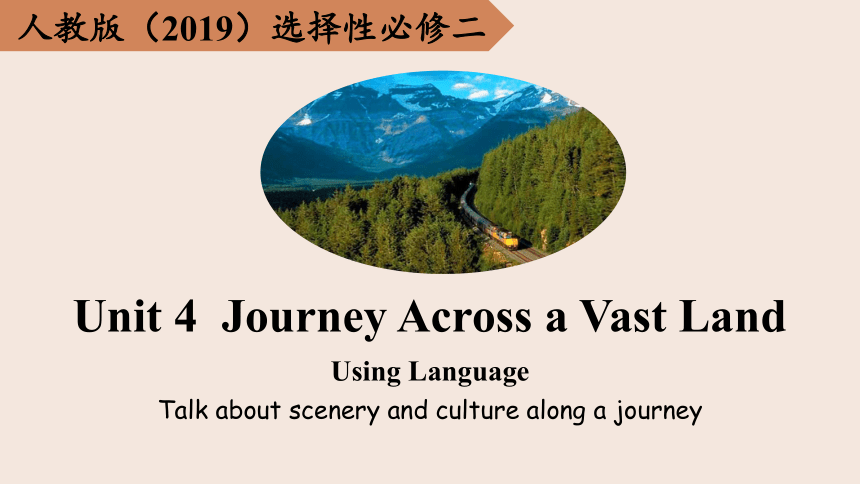 | |
| 格式 | pptx | ||
| 文件大小 | 11.4MB | ||
| 资源类型 | 教案 | ||
| 版本资源 | 人教版(2019) | ||
| 科目 | 英语 | ||
| 更新时间 | 2023-08-17 13:30:25 | ||
图片预览

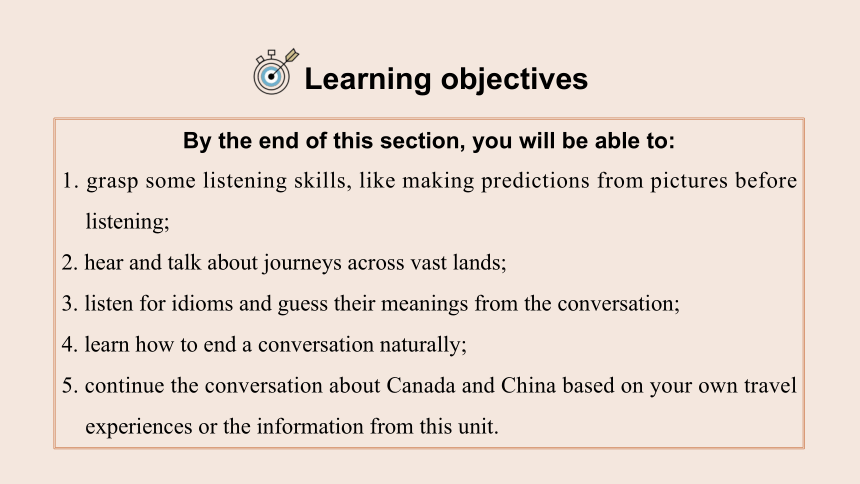
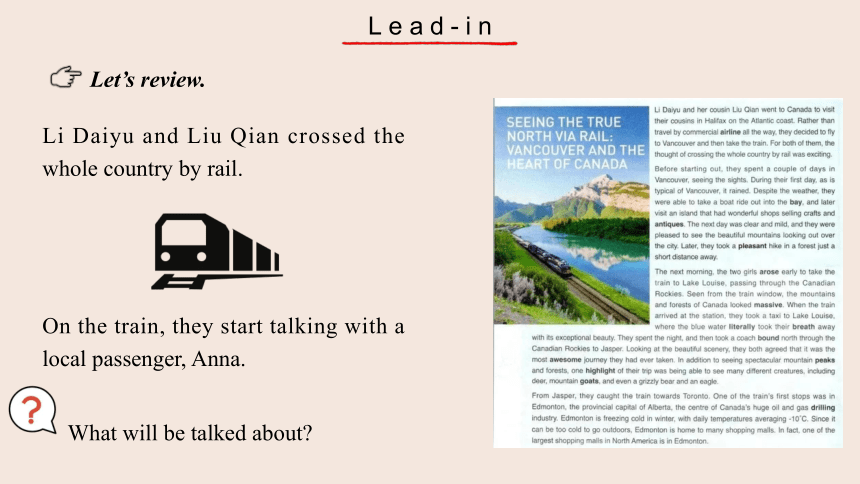
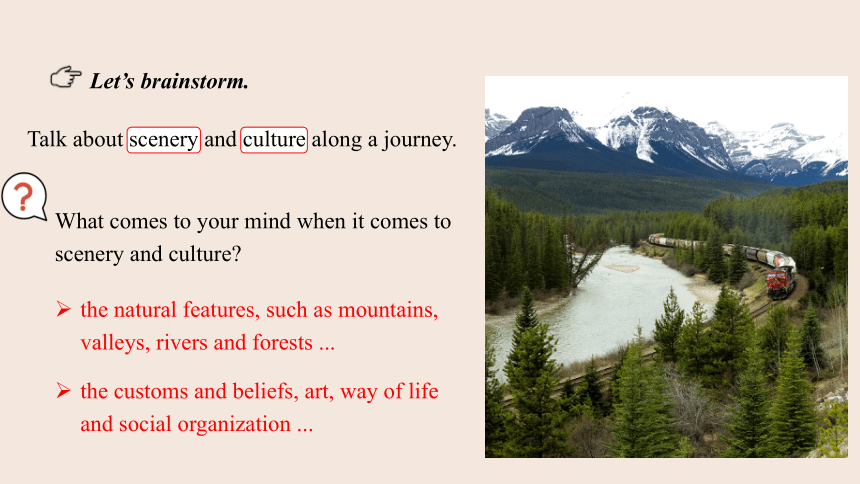
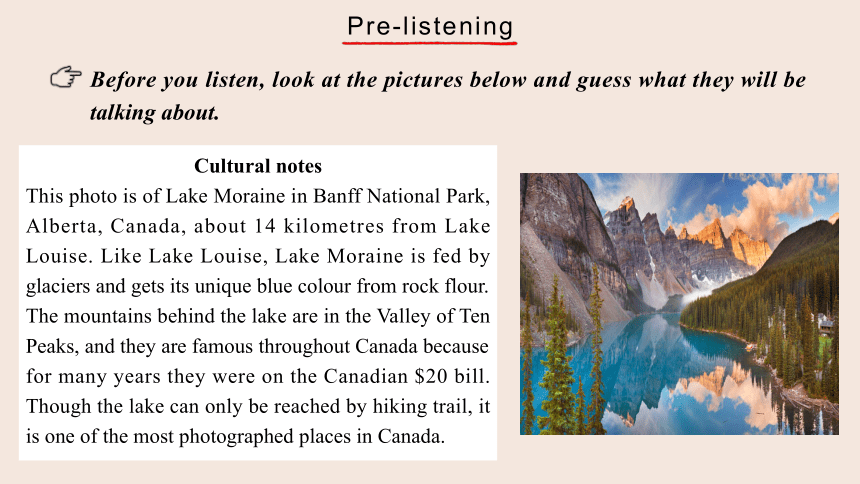
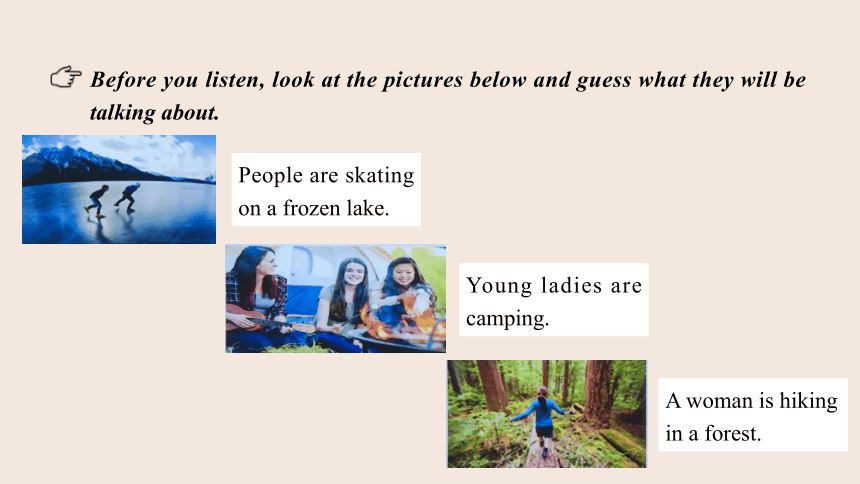
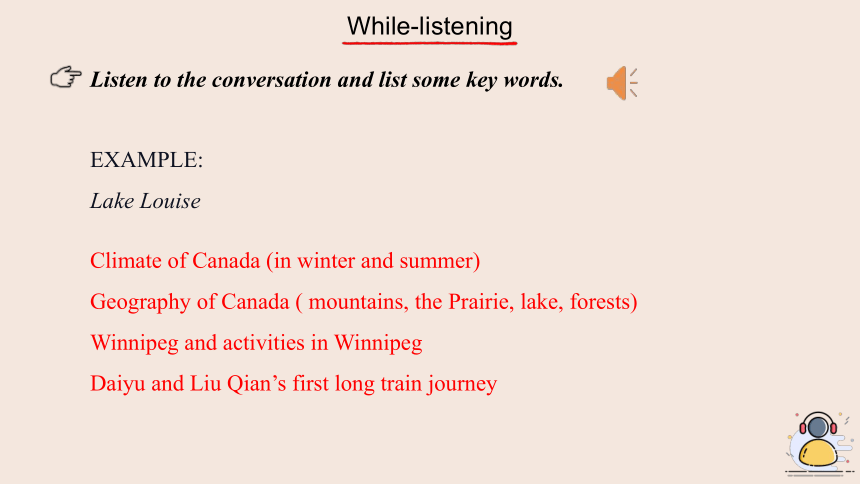
文档简介
(共15张PPT)
人教版(2019)选择性必修二
Unit 4 Journey Across a Vast Land
Using Language
Talk about scenery and culture along a journey
Learning objectives
By the end of this section, you will be able to:
1. grasp some listening skills, like making predictions from pictures before listening;
2. hear and talk about journeys across vast lands;
3. listen for idioms and guess their meanings from the conversation;
4. learn how to end a conversation naturally;
5. continue the conversation about Canada and China based on your own travel experiences or the information from this unit.
Lead-in
Let’s review.
Li Daiyu and Liu Qian crossed the whole country by rail.
On the train, they start talking with a local passenger, Anna.
What will be talked about
Let’s brainstorm.
What comes to your mind when it comes to scenery and culture
the natural features, such as mountains, valleys, rivers and forests ...
the customs and beliefs, art, way of life and social organization ...
Talk about scenery and culture along a journey.
Pre-listening
Before you listen, look at the pictures below and guess what they will be talking about.
Cultural notes
This photo is of Lake Moraine in Banff National Park, Alberta, Canada, about 14 kilometres from Lake Louise. Like Lake Louise, Lake Moraine is fed by glaciers and gets its unique blue colour from rock flour. The mountains behind the lake are in the Valley of Ten Peaks, and they are famous throughout Canada because for many years they were on the Canadian $20 bill. Though the lake can only be reached by hiking trail, it is one of the most photographed places in Canada.
Before you listen, look at the pictures below and guess what they will be talking about.
People are skating on a frozen lake.
Young ladies are camping.
A woman is hiking in a forest.
Listen to the conversation and list some key words.
While-listening
EXAMPLE:
Lake Louise
Climate of Canada (in winter and summer)
Geography of Canada ( mountains, the Prairie, lake, forests)
Winnipeg and activities in Winnipeg
Daiyu and Liu Qian’s first long train journey
Listen to the conversation and answer the following questions.
1. What do people do when Lake Louise freezes over in winter
2. What does Anna say about Canadian summers
3. How far is it from Edmonton to Winnipeg
4. What kinds of things do people do in Winnipeg
5. What other long rail journey have Li Daiyu and Liu Qian taken
5. What other long rail journey have Li Daiyu and Liu Qian taken
1. What do people do when Lake Louise freezes over in winter
2. What does Anna say about Canadian summers
3. How far is it from Edmonton to Winnipeg
4. What kinds of things do people do in Winnipeg
People like to go skating on the ice.
Many places of Canada have cool summers, while areas of south Canada have very hot summers.
More than 1,300 kilometres.
Skiing, hiking, camping, and city things like movies or restaurants on the weekends.
Last autumn, they travelled from Beijing to Moscow on the Trans-Siberian Railway through Mongolia.
Understand idioms
Idioms are often used in the English language. The meanings of some idioms can be guessed. However, many others need to be studied and remembered.
Listen again. Match the following idioms and similes with their meanings.
1 words fail me
2 as hot as an oven
3 as flat as a pancake
4 as far as the eye can see
5 dead centre
6 kill time
7 you name it
A with no mountains or hills
B all kinds of things
C for a long distance
D I’m surprised
E spend time
F very warm
G the exact middle of something
Listen to the conversation and fill in the following blanks.
Daiyu: Look there, Liu Qian! What a beautiful lake!
Liu Qian: Oh, my goodness! That must be Lake Louise! It’s so beautiful! Words ____ me.
Anna: Yes, that’s Lake Louise.
Daiyu: It’s pretty!
Anna: It’s even prettier in winter, after the lake ______ over. People like to go skating on the ice.
Liu Qian: Does all of Canada get so ____ in winter
Anna: A lot of it does.
Daiyu: So then, Canada must have cool summers as well.
Anna: That’s ________ true of many places. However, many areas of south Canada have a ___________ climate, with very hot
summers and very cold winters, so some days it gets as hot as an ______.
Liu Qian: Is all of Canada full of ________ like here
Anna: Oh, no. In fact, by the time we get to Edmonton, we’ll be in the Prairie. This is as flat as a pancake and ________ for as far
as the eye can see — more than 1,300 kilometres — until we reach Winnipeg. After that, there are lakes and forests.
Daiyu: What kind of place is Winnipeg
Anna: It’s a small city almost in the _____ centre of North America, from east to west.
Liu Qian: What do you do to _____ time there
Anna: Oh, you name it ... _______, hiking, camping. But also city things: movies or restaurants on the weekends, for example. So
is this your first long train journey
Daiyu: Oh, no. Last autumn, we travelled from Beijing to Moscow on the Trans-Siberian Railway through Mongolia.
Anna: How __________! What was it like
Liu Qian: Well, once you go north from Beijing, you pass through some low mountains and then enter the grasslands with its ______
hills.
Anna: Do a lot of people live in that area
Daiyu: Oh, not at all! There are a few small towns along the way, but the land is pretty ______. Sometimes you might see a few
horses or sheep. It’s beautiful.
Anna: Wow, that sounds __________!
fail
freezes
cold
certainly
continental
oven
mountains
stretches
dead
kill
skiing
interesting
rolling
empty
incredible
In groups of three, continue the conversation about Canada and China based on your own travel experiences or the information you heard or read in this unit. End the conversation naturally.
Post-listening
D = Daiyu LQ = Liu Qian A = Anna
A: I thought China would be very crowded, given its large population.
D: Well, contrary to what many people believe, there are a lot of vast and empty spaces in
China, actually.
A: That’s great! There must be amazing scenery to see in China then!
LQ: There is. My favourite trip was by train to Tibet. First, we travelled south across the
Kunlun Mountains.
D: Even though it was summer, they were still covered in snow. It was so beautiful.
LQ: Then we entered the Tibetan Plateau.
D: The scenery there was simply fantastic. Green grass as far as the eye could see. And
there were so many wild animals.
LQ: Yes! We saw a lot of antelopes, yaks, deer ... and I think I even saw a snow leopard.
Sample Dialogue
A: Good heavens! That’s one of the rarest animals on earth.
LQ: But you know what was really extraordinary about our trip
A: No, what
LQ: The railway is so high that the trains have a special oxygen supply for the
passengers, kind of like you would find on an airplane, so that no one will
become ill.
A: You’re kidding! Anyhow, the next station is my stop! Take care and enjoy the
rest of your trip!
D: Thanks, Anna!
LQ: It was really great to meet you!
A: And it was nice talking to you!
Sample Dialogue
Choose several idioms we have learnt today to make sentences.
Give a short report about what you have learnt from your conversation.
Homework
人教版(2019)选择性必修二
Unit 4 Journey Across a Vast Land
Using Language
Talk about scenery and culture along a journey
Learning objectives
By the end of this section, you will be able to:
1. grasp some listening skills, like making predictions from pictures before listening;
2. hear and talk about journeys across vast lands;
3. listen for idioms and guess their meanings from the conversation;
4. learn how to end a conversation naturally;
5. continue the conversation about Canada and China based on your own travel experiences or the information from this unit.
Lead-in
Let’s review.
Li Daiyu and Liu Qian crossed the whole country by rail.
On the train, they start talking with a local passenger, Anna.
What will be talked about
Let’s brainstorm.
What comes to your mind when it comes to scenery and culture
the natural features, such as mountains, valleys, rivers and forests ...
the customs and beliefs, art, way of life and social organization ...
Talk about scenery and culture along a journey.
Pre-listening
Before you listen, look at the pictures below and guess what they will be talking about.
Cultural notes
This photo is of Lake Moraine in Banff National Park, Alberta, Canada, about 14 kilometres from Lake Louise. Like Lake Louise, Lake Moraine is fed by glaciers and gets its unique blue colour from rock flour. The mountains behind the lake are in the Valley of Ten Peaks, and they are famous throughout Canada because for many years they were on the Canadian $20 bill. Though the lake can only be reached by hiking trail, it is one of the most photographed places in Canada.
Before you listen, look at the pictures below and guess what they will be talking about.
People are skating on a frozen lake.
Young ladies are camping.
A woman is hiking in a forest.
Listen to the conversation and list some key words.
While-listening
EXAMPLE:
Lake Louise
Climate of Canada (in winter and summer)
Geography of Canada ( mountains, the Prairie, lake, forests)
Winnipeg and activities in Winnipeg
Daiyu and Liu Qian’s first long train journey
Listen to the conversation and answer the following questions.
1. What do people do when Lake Louise freezes over in winter
2. What does Anna say about Canadian summers
3. How far is it from Edmonton to Winnipeg
4. What kinds of things do people do in Winnipeg
5. What other long rail journey have Li Daiyu and Liu Qian taken
5. What other long rail journey have Li Daiyu and Liu Qian taken
1. What do people do when Lake Louise freezes over in winter
2. What does Anna say about Canadian summers
3. How far is it from Edmonton to Winnipeg
4. What kinds of things do people do in Winnipeg
People like to go skating on the ice.
Many places of Canada have cool summers, while areas of south Canada have very hot summers.
More than 1,300 kilometres.
Skiing, hiking, camping, and city things like movies or restaurants on the weekends.
Last autumn, they travelled from Beijing to Moscow on the Trans-Siberian Railway through Mongolia.
Understand idioms
Idioms are often used in the English language. The meanings of some idioms can be guessed. However, many others need to be studied and remembered.
Listen again. Match the following idioms and similes with their meanings.
1 words fail me
2 as hot as an oven
3 as flat as a pancake
4 as far as the eye can see
5 dead centre
6 kill time
7 you name it
A with no mountains or hills
B all kinds of things
C for a long distance
D I’m surprised
E spend time
F very warm
G the exact middle of something
Listen to the conversation and fill in the following blanks.
Daiyu: Look there, Liu Qian! What a beautiful lake!
Liu Qian: Oh, my goodness! That must be Lake Louise! It’s so beautiful! Words ____ me.
Anna: Yes, that’s Lake Louise.
Daiyu: It’s pretty!
Anna: It’s even prettier in winter, after the lake ______ over. People like to go skating on the ice.
Liu Qian: Does all of Canada get so ____ in winter
Anna: A lot of it does.
Daiyu: So then, Canada must have cool summers as well.
Anna: That’s ________ true of many places. However, many areas of south Canada have a ___________ climate, with very hot
summers and very cold winters, so some days it gets as hot as an ______.
Liu Qian: Is all of Canada full of ________ like here
Anna: Oh, no. In fact, by the time we get to Edmonton, we’ll be in the Prairie. This is as flat as a pancake and ________ for as far
as the eye can see — more than 1,300 kilometres — until we reach Winnipeg. After that, there are lakes and forests.
Daiyu: What kind of place is Winnipeg
Anna: It’s a small city almost in the _____ centre of North America, from east to west.
Liu Qian: What do you do to _____ time there
Anna: Oh, you name it ... _______, hiking, camping. But also city things: movies or restaurants on the weekends, for example. So
is this your first long train journey
Daiyu: Oh, no. Last autumn, we travelled from Beijing to Moscow on the Trans-Siberian Railway through Mongolia.
Anna: How __________! What was it like
Liu Qian: Well, once you go north from Beijing, you pass through some low mountains and then enter the grasslands with its ______
hills.
Anna: Do a lot of people live in that area
Daiyu: Oh, not at all! There are a few small towns along the way, but the land is pretty ______. Sometimes you might see a few
horses or sheep. It’s beautiful.
Anna: Wow, that sounds __________!
fail
freezes
cold
certainly
continental
oven
mountains
stretches
dead
kill
skiing
interesting
rolling
empty
incredible
In groups of three, continue the conversation about Canada and China based on your own travel experiences or the information you heard or read in this unit. End the conversation naturally.
Post-listening
D = Daiyu LQ = Liu Qian A = Anna
A: I thought China would be very crowded, given its large population.
D: Well, contrary to what many people believe, there are a lot of vast and empty spaces in
China, actually.
A: That’s great! There must be amazing scenery to see in China then!
LQ: There is. My favourite trip was by train to Tibet. First, we travelled south across the
Kunlun Mountains.
D: Even though it was summer, they were still covered in snow. It was so beautiful.
LQ: Then we entered the Tibetan Plateau.
D: The scenery there was simply fantastic. Green grass as far as the eye could see. And
there were so many wild animals.
LQ: Yes! We saw a lot of antelopes, yaks, deer ... and I think I even saw a snow leopard.
Sample Dialogue
A: Good heavens! That’s one of the rarest animals on earth.
LQ: But you know what was really extraordinary about our trip
A: No, what
LQ: The railway is so high that the trains have a special oxygen supply for the
passengers, kind of like you would find on an airplane, so that no one will
become ill.
A: You’re kidding! Anyhow, the next station is my stop! Take care and enjoy the
rest of your trip!
D: Thanks, Anna!
LQ: It was really great to meet you!
A: And it was nice talking to you!
Sample Dialogue
Choose several idioms we have learnt today to make sentences.
Give a short report about what you have learnt from your conversation.
Homework
